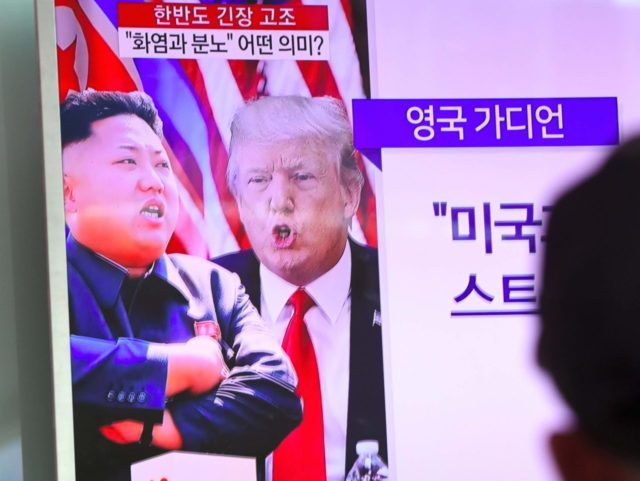After a respite following the announcement that President Donald Trump had accepted an invitation to meet with dictator Kim Jong-un, North Korea’s state media have returned with gusto to their usual invective against the United States, railing in columns published Tuesday against the “world [sic] biggest arms seller.”
“U.S. arms are flooding the countries and areas in which the military confrontation is acute,” Rodong Sinmun, the communist state newspaper, argued in an editorial Monday, appearing in the English-language Korean Central News Agency (KCNA) on Tuesday. “The U.S. is the world [sic] biggest arms seller as in the past.”
The column appeared to be a response to a new study showing an increase in global weapons proliferation between 2008 and 2012.
“It is due to the U.S., the top class war merchant that spawns war and massacre in different parts of the world through large-scale arms sale, going against the desire of mankind for peace and stability,” the column argued. “The warmonger is not in a position to talk about peace.”
It goes on to blame Japan, a longtime North Korean media foe, for “importing many offensive weapons from the U.S.” and becoming a “dangerous force for reinvasion and a fanatical entity of militarism threatening peace and stability in Northeast Asia.”
In a separate article published Monday, Rodong Sinmun also condemned “globalization,” claiming the word represents the idea that human rights apply universally to all people and all governments must abide by them.
“‘Globalization’ is the imperialists’ world domination strategy aimed to achieve the hegemonic ambition with ease through the Western view of value,” the newspaper claimed. “The imperialists force ‘globalization’ on other countries, asserting that it gives everyone an equal opportunity and makes it possible to create global ideology and culture that can be shared by all and to increase the productivity and efficiency by optimizing the use of resources.”
It goes on to conclude that globalists’ “objective is to make the globe a Western-style liberal world and subordinate and assimilate all the countries and nations to them.”
The article does not mention the United States in particular, but its repeated condemnation of “Western-style” human rights norms appears directed at America.
The column also did not address the promotion of globalist policies by North Korea’s largest benefactor and trading partner, China.
“In pursuing economic globalization, we should make it more open, more inclusive, more balanced, more equitable and more beneficial to all,” Chinese communist leader Xi Jinping said in a November 2017 speech in which he referred to “globalism” as an “irreversible historical trend.” A year earlier, Xi asserted that globalism “is in keeping with the law of economics and delivers benefits to all.”
Rumors surfaced throughout the world on Monday that Kim Jong-un himself may be currently on a visit to China after cameras caught an antiquated North Korean train traveling from Pyongyang to Beijing, accompanied by a mysteriously high level of security. Neither China nor North Korea has confirmed who was on that train or why it made the voyage it did, but by Tuesday afternoon, the train had begun its journey back to North Korea.
The latest attacks from Rodong Sinmun follow several weeks in which the newspaper toned down its invective against the United States. The day after the announcement on the White House lawn that Trump would plan an in-person meeting with Kim by May, the newspaper condemned the “wicked U.S.” to its “doom” as usual, but two weeks later, the outlet acknowledged a “sign of change” in the relationship between Washington and Pyongyang. North Korea has yet to publish a report on Trump’s acceptance of the invite, meaning the average North Korean does not know that the rest of the world expects a thaw in the relationship between the two countries. The United States and North Korea are technically at war, as no treaty was signed in the aftermath of the Korean War.
Some reports from South Korea have suggested that Kim is seeking to meet Trump to sign a treaty that would allow for peacetime relations between the two countries. Seoul officials have told media that their impression is that Pyongyang is “cautious” about trusting the United States and does not yet feel comfortable discussing the logistics of the meeting between the president and the tyrant. The State Department has confirmed it has received no word from North Korean officials about planning the meeting.

COMMENTS
Please let us know if you're having issues with commenting.